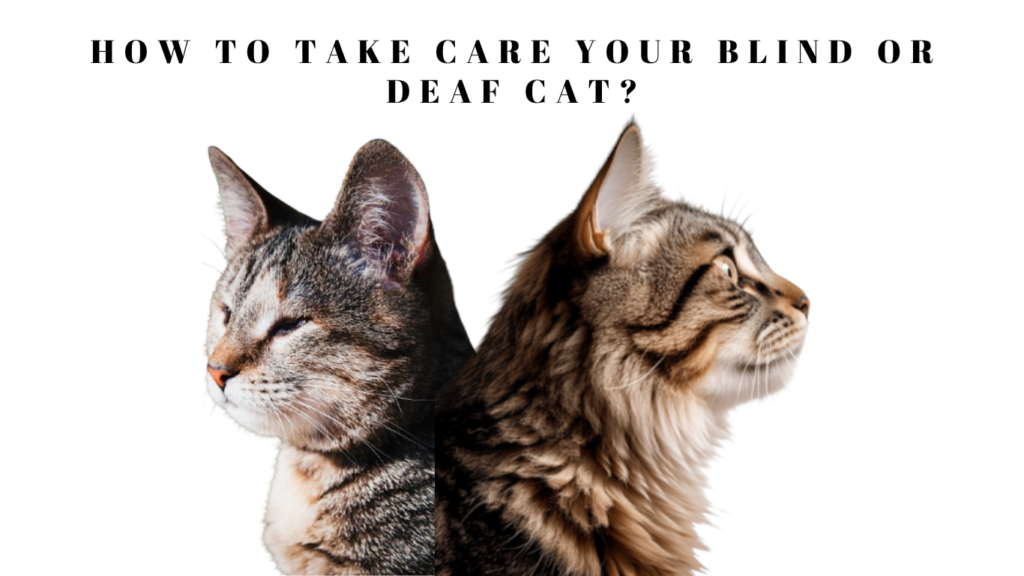Caring for a blind or deaf cat might seem daunting at first, but these remarkable animals can thrive with your love and support. Understanding their unique needs and adapting your home and habits will ensure they lead happy, healthy lives.
Understanding Blind and Deaf Cats
Blind Cats
Blindness in cats can result from injury, illness (like glaucoma or cataracts), or aging.
How they adapt: Blind cats rely on their acute hearing, smell, and tactile senses to navigate the world. They can memorize furniture arrangements and develop a mental map of their surroundings.
Deaf Cats
Deafness is often genetic (especially in white cats with blue eyes) but can also occur due to aging or infections.
How they adapt: Deaf cats are visually attentive and often sense vibrations. They may meow louder than usual, compensating for their inability to hear their voice.
Step-by-Step Guide to Caring for a Blind or Deaf Cat
1. Create a Stable Environment
Blind and deaf cats thrive on predictability.
- Avoid moving furniture: Keep their paths clear of obstacles.
- Mark zones: Use textured rugs or mats near food, water, and litter areas.
- Secure the outdoors: Blind or deaf cats should only explore in secure, enclosed spaces.
2. Communicating with Your Cat
- Blind Cats: Speak calmly when approaching to avoid startling them. Call them using verbal cues or sounds like clapping or jingling keys.
- Deaf Cats: Use consistent hand signals or tap gently on a surface to get their attention. Pair gestures with rewards to build trust.
3. Interactive Play and Enrichment
Keeping your cat stimulated reduces stress and boosts their confidence:
- For Blind Cats: Use toys with bells, crinkle sounds, or strong scents like catnip.
- For Deaf Cats: Offer brightly colored toys, laser pointers, or feather wands.
4. Ensure Safety at All Times
- Blind Cats:
- Block off dangerous areas like open staircases or balconies.
- Use gates or barriers to limit access to unsafe zones.
- Deaf Cats:
- Always approach them from the front to avoid startling them.
- Keep them away from hazards they might not detect, like oncoming cars or loud machinery.
5. Regular Health Monitoring
Schedule frequent check-ups to monitor their overall well-being. Conditions like ear infections or ocular diseases may worsen without prompt care.
Additional Tips for a Happy Life
Socialization and Companionship
Blind and deaf cats can feel isolated if not socialized properly.
- Introduce pets or people slowly: Let them sniff or observe from a distance before full interactions.
- Offer comfort items: Their favorite blanket or toy provides reassurance in unfamiliar situations.
Feeding and Hydration
- Place their food and water bowls in a fixed location.
- Blind cats may benefit from bowls with strong smells or textures to locate food.
- Deaf cats may be startled by sudden movements—feed them in a quiet, safe area.
Training for Blind or Deaf Cats
Training is possible with consistency and patience.
- For Blind Cats: Use positive reinforcement with sounds like clicks or claps.
- For Deaf Cats: Pair gestures with treats. For example, show a thumbs-up for “good behavior.”
FAQs About Blind or Deaf Cats
Q: Can a blind or deaf cat be left alone?
Yes, but ensure their environment is safe. Use baby monitors or cameras to check on them if you’re away for extended periods.
Q: How can I introduce a blind or deaf cat to a new home?
Start them in a small, secure room. Gradually allow them to explore other areas while maintaining consistency in furniture placement.
Q: Are blind or deaf cats more prone to anxiety?
They may experience initial anxiety but adapt over time with a stable routine, enriched environment, and your comforting presence.
Why Blind and Deaf Cats Are Special
Blind and deaf cats are just as playful, loving, and intelligent as other cats. Their resilience and adaptability are inspiring, proving that disabilities don’t limit the capacity for joy and affection. By providing them with understanding and care, you’ll build a bond that’s truly extraordinary.
